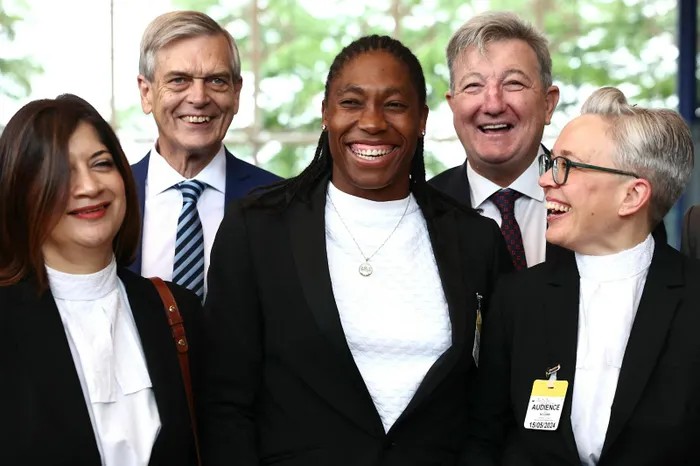Caster’s victory a win for all athletes

South Africa’s double Olympic champion runner Caster Semenya speaks with her lawyers Schona Jolly, Patrick Brancher, Gregory Nott and Claire McCann as she arrives at the European Court of Human Rights (ECHR) for a hearing in Strasbourg, eastern France, on May 15, 2024.
Image: Frederick FLORIN / AFP
TWO-TIME Olympic gold medalist Caster Semenya believes her landmark victory at the European Court of Human Rights (ECHR) will pave the way for all athletes’ human rights to be protected.
“I have waited 15 long years for this judgment. Today, my patience in this journey has been rewarded with a result that will pave the way for all athletes’ human rights to be protected. I have given up what I wanted in the hope that others may have what they need. I hope this victory will inspire young women to be and accept themselves in all their diversity.”
The ECHR found that Semenya was denied a fair trial by Switzerland’s legal system, marking a significant milestone in her ongoing legal battle against regulations requiring athletes with differences of sex development (DSD) to medically alter their natural hormone levels to compete.
In a Grand Chamber judgment on Thursday, the court ruled by 15 votes to two that the Swiss Federal Supreme Court failed to conduct a sufficiently rigorous review of Semenya’s appeal against the 2019 decision by the Court of Arbitration for Sport (CAS), which had upheld World Athletics' so-called “DSD Regulations”.
These rules compel female athletes with naturally high testosterone levels to undergo hormone suppression therapy to compete in certain events.
The court found that Switzerland had violated Semenya’s rights under Article 6(1) of the European Convention on Human Rights, which guarantees the right to a fair hearing.
The judges held that the Federal Supreme Court’s review of the CAS award was too limited, especially given the fundamental rights at stake, including bodily autonomy and the right to compete in one’s natural category.
As a result, Semenya had not benefited from the necessary safeguards required by the Convention.
The judgment found that, although the CAS is not a state body, its mandatory and exclusive jurisdiction imposed by sports federations such as World Athletics creates an imbalance of power.
Athletes have no choice but to submit to this process if they want to compete internationally.
The ECHR said that this structural inequality, combined with the nature of the rights affected, required a particularly rigorous review by Switzerland’s top court, something it failed to provide. The court awarded Semenya €80,000 (about R1.6 million) for legal costs, though she had not sought any damages.
Semenya had argued that the regulations not only impacted her career but also infringed on her bodily integrity and were discriminatory.
While the Grand Chamber ruled her complaints under Articles 8 (right to private life), 13 (right to an effective remedy), and 14 (prohibition of discrimination) inadmissible, on the basis that they fell outside Switzerland’s jurisdiction, it emphasised that once she brought the case before the Federal Supreme Court, Switzerland assumed responsibility for ensuring her right to a fair legal process.
The decision does not directly overturn the DSD regulations but opens the way for further legal challenge and scrutiny of how national courts handle arbitration decisions involving fundamental human rights.
Semenya’s lawyer, Gregory Nott of Norton Rose Fulbright South Africa, called it “a resounding victory not only for Caster but for the principles of equality, fairness, and bodily autonomy in international sport”.
“The court recognised the imbalance that athletes like Caster face when challenging powerful governing bodies. It is a reminder that all sportspeople are entitled to fundamental human rights, and those rights must be protected.”
The South African Human Rights Commission was an intervening party in the case. The commission’s Professor Tshepo Madlingozi said the outcome affirms that “sportspeople are not outside the scope of human rights”.
“This is a victory not only for Caster but for all athletes who face discrimination under the guise of regulation. The court made it clear that institutions such as World Athletics cannot be allowed to impose conditions that violate bodily autonomy without rigorous judicial oversight.”
The judgment does not immediately restore Semenya’s eligibility to compete in events like the 800 metres without hormone treatment.
However, it opens a potential path forward, either through renewed legal challenge or through policy reform sparked by international human rights pressure.
Cape Times
Related Topics: